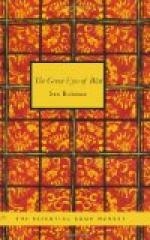I often stopped for a chat at this point and I was acquainted with most of the men of P. division on whom the duty devolved from time to time. It was a lonely spot at night when the residents in the neighborhood had retired, so that the darkened houses seemed to withdraw yet farther into the gardens separating them from the highroad. A relic of the days when trains and motor-buses were not, dusk restored something of an old-world atmosphere to the village street, disguising the red brick and stucco which in many cases had displaced the half-timbered houses of the past. Yet it was possible in still weather to hear the muted bombilation of the sleepless city and when the wind was in the north to count the hammer-strokes of the great bell of St. Paul’s.
Standing in the shelter of the little hut, I listened to the rain dripping from over-reaching branches and to the gurgling of a turgid little stream which flowed along the gutter near my feet whilst now and again swift gusts of the expiring tempest would set tossing the branches of the trees which lined the way.
“It’s much cooler to-night,” said the sergeant.
I nodded, being in the act of lighting my pipe. The storm had interrupted a spell of that tropical weather which sometimes in July and August brings the breath of Africa to London, and this coolness resulting from the storm was very welcome. Then:
“Well, good night,” I said, and was about to pursue my way when the telephone bell in the police-hut rang sharply.
“Hullo,” called the sergeant.
I paused, idly curious concerning the message, and:
“The Red House,” continued the sergeant, “in College Road? Yes, I know it. It’s on Bolton’s beat, and he is due here now. Very good; I’ll tell him.”
He hung up the receiver and, turning to me, smiled and nodded his head resignedly.
“The police get some funny jobs, sir,” he confided. “Only last night a gentleman rang up the station and asked them to tell me to stop a short, stout lady with yellow hair and a big blue hat (that was the only description) as she passed this point and to inform her that her husband had had to go out but that he had left the door-key just inside the dog-kennel!”
He laughed good-humoredly.
“Now to-night,” he resumed, “here’s somebody just rung up to say that he thinks, only thinks, mind you, that he has forgotten to lock his garage and will the constable on that beat see if the keys have been left behind. If so, will he lock the door from the inside, go out through the back, lock that door and leave the keys at the station on coming off duty!”
“Yes,” I said. “There are some absent-minded people in the world. But do you mean the Red House in College Road?”
“That’s it,” replied the sergeant, stepping out of the hut and looking intently to the left.
“Ah, here comes Bolton.”
He referred to a stolid, red-faced constable who at that moment came plodding across the muddy road, and:




